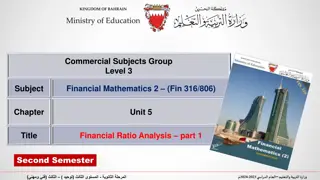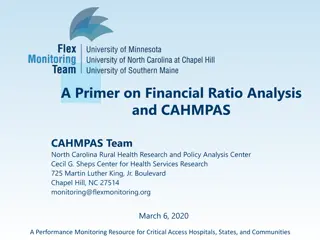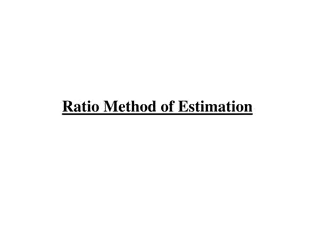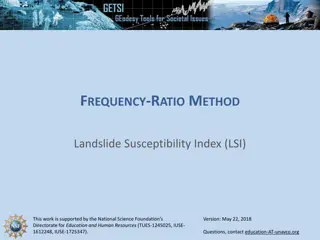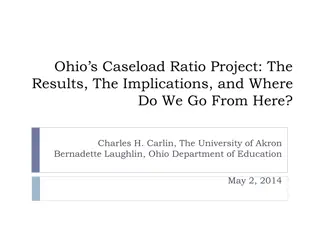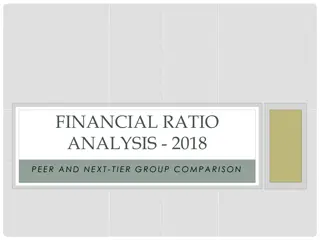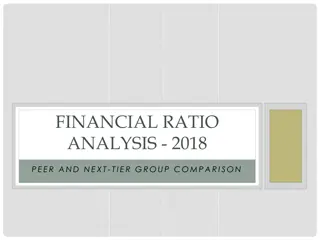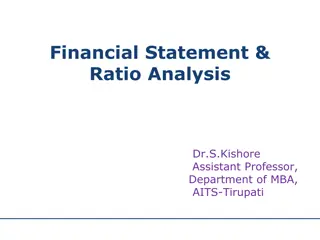Prioritizing Clinically Important Outcomes Using Hierarchical Win Ratio
Clinical trials often use composite outcomes, but conventional analysis methods have limitations in accurately reflecting clinical reality. Hierarchical outcomes offer flexibility by defining a hierarchy of events based on importance. Analyzing trials using hierarchical outcomes involves comparing p
7 views • 20 slides
Understanding EU Taxonomy and Green Asset Ratio Update
Delve into the latest updates on EU Taxonomy and Green Asset Ratio, legislation, reporting obligations for large companies, and key performance indicators for reporting under EU Taxonomy. Explore how the European Commission's Action Plan on Sustainable Finance and the EU Green Deal are shaping ESG r
145 views • 18 slides
Insights on Infant Mortality and Safe Sleep Practices in Illinois
Exploring the definitions of infant mortality and safe sleep practices, this content delves into the Infant Mortality Ratio (IMR) and Sudden Unexpected Infant Death (SUID) Mortality Ratio. Data sources such as vital records and the Pregnancy Risk Assessment Monitoring System (PRAMS) shed light on th
0 views • 57 slides
Understanding Quantitative Credit Control Methods in RBI's Monetary Policy
RBI's monetary policy revolves around maintaining credit quantity in the market through quantitative credit control methods. This includes Bank Rate Policy, Open Market Operations, Cash Reserve Ratio (CRR), and Statutory Liquidity Ratio (SLR). These tools help regulate credit flow, liquidity, and ma
4 views • 8 slides
Understanding Pulmonary Circulation and V/Q Ratio in Respiratory Physiology
Explore the high-pressure and low-pressure circulations supplying the lungs, the concept of physiological shunt in pulmonary circulation, different lung zones based on blood flow, V/Q ratio and its clinical significance, and abnormal V/Q ratio patterns. Delve into the role of pulmonary circulations
11 views • 28 slides
Financial Ratio Analysis and Profitability Ratios Overview
This unit focuses on financial ratio analysis, specifically profitability ratios like gross profit margin, designed to assess a business's financial performance based on its financial statements. By comparing information such as revenues, costs, assets, and liabilities, businesses can evaluate their
1 views • 13 slides
COMMIT: Comprehensive Online Modified Modules for Induction Training
The COMMIT program aims to enhance public service delivery, promote good governance, and provide induction training to frontline government functionaries. It offers a blend of face-to-face and e-learning modules covering soft skills and domain-specific topics. Currently being piloted in six states,
0 views • 6 slides
Understanding Fibonacci Sequence and the Golden Ratio
Fibonacci numbers are a sequence of numbers starting with 0, 1, where each number is the sum of the two preceding numbers. This sequence, discovered by Leonardo Fibonacci, displays a fascinating relationship to the Golden Ratio when examining the ratios of consecutive numbers. The Golden Ratio, appr
1 views • 55 slides
Understanding Ventilation-Perfusion Ratio in Pulmonary Circulation
This lecture delves into the intricate relationship between ventilation and perfusion in the lungs, highlighting the importance of proper gas exchange for optimal respiratory function. It discusses the circulations supplying the lungs, defines the V/Q ratio, and explores the clinical significance of
0 views • 25 slides
Converting Measurements using Ratio in Math Education
Explore the concept of converting measurements using ratio in Math education. Learn how to convert between customary and metric units through multiplication or division, and solve problems with ratio and proportion. Discover key vocabulary like Customary Unit, Metric Unit, Conversion, Ratio, and Pro
1 views • 23 slides
A Primer on Financial Ratio Analysis and CAHMPAS
This resource by the CAHMPAS Financial Team at University of North Carolina provides an in-depth look into financial ratio analysis, including the theory, types of analyses, and the importance of understanding financial indicators. It discusses how businesses can assess their financial performance a
0 views • 87 slides
Evolution of the Ratio Formationis Generalis in Congregational Formation
Evolution and significance of the Ratio Formationis Generalis in Congregational Formation, from its historical development to the need for updates in response to changes in formation programs and Vatican documents. The formation of Units, Conferences, Directories, and Programs based on the Ratio, hi
4 views • 16 slides
Understanding Ratio Analysis in Financial Statements
Ratio analysis is a crucial process in interpreting financial statements by deriving accounting ratios from the balance sheet and profit and loss account. It involves assessing short-term liquidity, long-term solvency, activity ratios, and profitability ratios. Liquidity ratios like current ratio, q
2 views • 41 slides
Understanding Odds Ratio and Bias in Case-Control Studies
This educational material covers the essentials of odds ratio and bias in case-control studies, including how to construct a 2x2 table, calculate odds ratio, define bias, and interpret results. A specific case study on pesticide exposure and cancer is presented to illustrate these concepts. Readers
2 views • 20 slides
Understanding Banking Concepts and Monetary Policies
Explore key banking concepts such as Currency Deposit Ratio, Reserve Deposit Ratio, Statutory Liquidity Ratio, High-Powered Money, and their significance in regulating the money supply and liquidity in an economy. These concepts shed light on the relationship between currency, deposits, reserves, an
0 views • 14 slides
Working Capital and Current Ratio in Accounting
Understanding indicators like net current assets (working capital) and current ratio is crucial in accounting. Net current assets reflect the ability to settle current liabilities and the capital required for operational functions. Managing working capital effectively involves factors like stock man
0 views • 12 slides
Ratio Method of Estimation in Statistics
The Ratio Method of Estimation in statistics involves using supplementary information related to the variable under study to improve the efficiency of estimators. This method uses a benchmark variable or auxiliary variable to create ratio estimators, which can provide more precise estimates of popul
0 views • 30 slides
Overview of Git Commit Workflow
Explore the Git Commit Workflow, including commands like git log, git diff, git status, git add, git commit, and git show. Learn about the importance of the .git folder in a repository and how to identify commits using their SHA-1 hashes.
0 views • 23 slides
Ratios in Different Scenarios
Explore and solve various ratio-related problems involving counters, bees, spiders, bread rolls, ladybirds, and spiders. From determining the number of red counters given the ratio to finding out the quantity of bread rolls in multiple baskets based on the provided ratio, these exercises help streng
1 views • 18 slides
Victimisation and Agency in Young Women Who Commit Violent Offences
This study delves into the victimisation and agency experienced by young women who commit violent offences, exploring their subjective perceptions of violence, sources of self-perception, impact on behavior, and portrayal in societal discourses.
0 views • 26 slides
Understanding Standardized Infection Ratio (SIR) in Healthcare
The Standardized Infection Ratio (SIR) is a crucial metric used to monitor Healthcare-Associated Infections (HAIs) at various levels. It allows for improved risk adjustment and comparison by providing a single summary number. Standardization methods like direct and indirect standardization help in a
0 views • 44 slides
Understanding Git Commit History Options
Explore various options to view Git commit history using $git log command, such as -p to show differences, --stat for file stats, --pretty for different output formats, and --graph for branch history visualization. Customize log output using --pretty=format to display specific commit information.
0 views • 9 slides
Understanding Landslide Susceptibility Using Frequency-Ratio Method
This informative content delves into the Frequency-Ratio Method for Landslide Susceptibility Index (LSI), supported by the National Science Foundation. It explains how Frequency-Ratio (FR) methods are used for analyzing landslide susceptibility, the mathematical calculations involved in determining
0 views • 15 slides
Ohio's Caseload Ratio Project: Results and Implications
Ohio's Caseload Ratio Project explores the history of caseloads in Ohio, the impact of IDEA mandates, and the formation of a Steering Committee to address caseload ratio issues. The study delves into the data collection process, workload determination, and the need for appropriate and defensible cas
0 views • 36 slides
High-Performance Transactions for Persistent Memories
Explore the optimization of transactions for persistent memories, focusing on ordering constraints, synchronous vs. deferred commit transactions, persistency models, and performance evaluation. The study aims to improve transaction performance in the presence of high persistent memory latencies by m
0 views • 26 slides
Ratio Sharing Practice Problems with Solutions
Solve various ratio sharing problems such as sharing numbers and sweets in given ratios between two people, finding equivalent ratios, and creating your own ratio sharing scenarios. Understand how to distribute quantities based on ratios and calculate each person's share accurately.
0 views • 9 slides
Understanding Equivalent Ratios and Solving Ratio Problems
Delve into the concept of equivalent ratios and learn how to solve ratio problems step by step. Explore methods for listing equivalent ratios, simplifying ratios, and applying ratios to real-world scenarios. Enhance your skills in working with ratios by practicing on whiteboards and in books. Discov
0 views • 17 slides
Analysis of Transactional Memory Techniques in Multi-Core Architectures
Emerging multi-core architectures have led to the adoption of Transactional Memory (TM) as a new synchronization method. This study delves into the challenges of TM, examining the consequences of transaction aborts, the need for spare aborts, and evaluating measures to enhance transaction processing
0 views • 23 slides
Financial Ratio Analysis 2018 Peer and Next-Tier Group Comparison
This financial ratio analysis for 2018 compares the viability ratios and primary reserve ratios of various institutions within the peer and next-tier groups. The Viability Ratio assesses an institution's ability to cover its long-term debt with expendable net assets, while the Primary Reserve Ratio
0 views • 15 slides
Understanding SPCSA Financial Performance Framework
The SPCSA Financial Performance Framework outlines objectives for enabling SPCSA to fulfill its regulatory mission, requirements for financial indicators, transparency in reporting, and conveying expectations to charter schools. It defines a performance framework as a document setting performance ex
0 views • 14 slides
Understanding Ratio Analysis in Accounting
This educational material explores the essential concepts of ratio analysis in accounting, focusing on the interpretation of financial statements to assess company performance, establish trends, aid in decision-making, and facilitate comparisons. The content covers the objectives and users of ratio
0 views • 18 slides
Understanding Financial Ratios for Business Analysis
Financial ratios like current ratio, quick ratio, inventory turnover ratio, asset turnover ratio, and profit margin ratio are crucial tools for assessing a company's financial health and performance. Current ratio measures short-term debt-paying ability, quick ratio assesses liquidity, inventory tur
0 views • 15 slides
Comparative Financial Ratio Analysis 2018 for Higher Education Institutions
This analysis compares the Viability Ratio and Primary Reserve Ratio of peer and next-tier higher education institutions in 2018. The Viability Ratio assesses an institution's ability to cover its debt with expendable net assets, while the Primary Reserve Ratio measures how long an institution can o
0 views • 15 slides
Understanding Financial Statement and Ratio Analysis
This informative content discusses the importance of financial statement and ratio analysis in assessing a firm's past, present, and future financial conditions. It covers the primary tools used, such as financial statements and comparison of financial ratios, as well as the objectives of ratio anal
0 views • 35 slides
Teaching Compound Measures Using Ratio & Proportion
Explore the fascinating world of compound measures using ratio and proportion with Kathryn Darwin, Deputy Subject Leader of Maths at Manor Croft Academy, Dewsbury. Dive into sessions covering the challenges with triangles, speed calculations, prerequisites, bar models, ratio tables, unit changes, de
0 views • 25 slides
Understanding Ratio Strength and Milligrams Percent in Pharmacy Practice
In the field of pharmacy practice, understanding ratio strength and milligrams percent is essential for preparing solutions accurately. Ratio strength involves expressing concentrations in parts per hundred, while milligrams percent denotes the amount of substance in 100 mL of liquid. This article e
0 views • 10 slides
Effective Git Version Control Strategies for Collaborative Development
Git version control system provides a powerful way to manage code changes efficiently, allowing for collaboration and seamless integration of developments. This presentation explores key concepts of Git, including branching, merging, commit messages, and workflows. By following best practices such a
0 views • 19 slides
Understanding Virtual Synchrony and Commit Protocols in Distributed Systems
Explore the concepts of virtual synchrony, commit protocols, and reliable multicasting in distributed systems. Learn about one-to-one communication, process groups, and virtually synchronous multicast, along with implementations in LAN environments. Discover how processes can handle failures and ens
0 views • 23 slides
Enhancing Storage Consistency in Persistent Memory Systems
Persistent memory systems face challenges with strict write ordering requirements affecting performance. This study introduces Loose-Ordering Consistency to minimize overhead while ensuring storage consistency by leveraging hardware support and innovative commit protocols. Results show a significant
0 views • 26 slides
Spanner Database Overview
Spanner is a globally distributed database system that offers configurable control, consistent commit timestamps, external consistency, and TrueTime API for handling distributed data. It uses a transaction model with two-phase locking and lock-free reads, providing globally sortable timestamps. The
0 views • 19 slides





